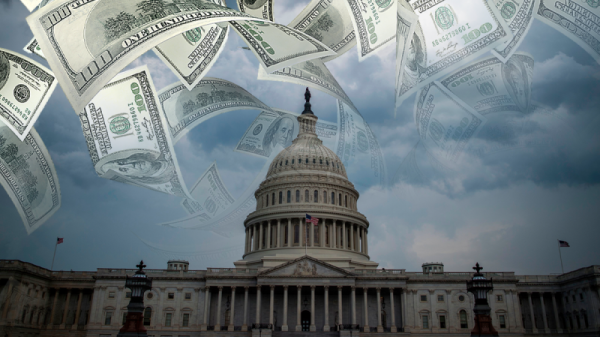On its surface, the elevation of Mike Johnson to House speaker would seem to be bad news for Ukraine funding. The Louisiana congressman has an “F” rating from the Republicans for Ukraine advocacy group, having consistently voted with a minority of House Republicans against sending money.
With Ukraine funding opponents now approaching a crucial majority in the House GOP conference and forming the most vocal part of the GOP base, you could forgive them for thinking they’ve notched a major victory by elevating Johnson.
But the reality is more complicated. Despite his voting record, Johnson’s rhetoric has often aligned with the party’s Russia hawks. And since winning the gavel, he’s saying the kind of things that suggest the funding is a priority.
That was the case during his first long-form interview as speaker, on Thursday night with Fox News’s Sean Hannity.
Although Johnson distanced himself from the plan of the White House and Senate Minority Leader Mitch McConnell (R-Ky.) for a joint Israel-Ukraine funding bill, he seemed to go out of his way to play up the need to aid Ukraine.
“Now, we can’t allow Vladimir Putin to prevail in Ukraine, because I don’t believe it would stop there, and it would probably encourage and empower China to perhaps make a move on Taiwan,” Johnson said. “We have these concerns. We’re not going to abandon them.”
Perhaps most notable, Johnson actually broached Ukraine funding before Hannity did. Johnson mentioned it alongside other immediate concerns, while downplaying other issues.
“We have such big priorities in this moment right now, Sean. We have Israel being attacked. We have unrest. We have the Ukraine situation we have got to deal with,” Johnson said, also mentioning China, Iran, the economy, the border and fentanyl.
Johnson also connected the Russian threat to China and Iran, seemingly aligning with McConnell’s “axis of evil” talking point. Johnson cited “China, Russia and Iran working together.”
Johnson’s comments build on what he said shortly after winning the gavel, when he suggested that “we all” support Ukraine funding — something that isn’t technically true of the House GOP — but that Kyiv needs to be more accountable.
That seems to be the rub with Johnson. Unlike the Marjorie Taylor Greenes and Matt Gaetzes of the party, he has repeatedly emphasized that the United States has a crucial foreign policy objective in Ukraine — and even that Russia’s aggression threatens the United States:
“If we do not show decisive strength in this moment, Putin’s aggression will increase,” he said in February 2022 when Russian troops were mobilizing.“Russia’s invasion of Ukraine’s sovereign territory threatens the greatest destabilization of the world order since [World War II] and constitutes a national security threat to the entire West,” he said days later, upon the actual invasion.“Ukraine has to prevail,” he added last month.
Johnson has also occasionally spoken the language of the more staunch Ukraine funding skeptics. Last year, he suggested not only that the funding needs more scrutiny but that there’s too much of it, and that other issues are more pressing.
“We should not be sending another $40 billion abroad when our own border is in chaos, American mothers are struggling to find baby formula, gas prices are at record highs, and American families are struggling to make ends meet, without sufficient oversight over where the money will go,” he said in May 2022, after becoming one of just 58 House Republicans to vote against a $40 billion package.
But that kind of talk is more the exception than the rule when it comes to Johnson’s relatively infrequent public commentary. After repeatedly emphasizing the need to help Ukraine for moral reasons as well as the United States’ own purposes — as he did Thursday — it would be discordant for him not to push pretty hard for the funding.
There remain big questions. Among them: whether he might push for less funding than others want, what kinds of accountability he would require, whether he will demand potentially tricky spending offsets similar to those he’s talking about for Israel funding, and whether the bifurcated approach he has adopted toward Israel and Ukraine funding might harm Ukraine’s prospects.
The ascendant Ukraine funding skeptics could certainly make this an arduous process for a man just getting his feet beneath him as speaker. Or they could decide to give him some leeway, given his credibility with them. As with former speaker Kevin McCarthy (R-Calif.), it might ultimately come down to just how much political capital he is willing to spend on something his public comments suggest is a matter of principle.
But for now, he has made some significant overtures in Ukraine’s direction.
On its surface, the elevation of Mike Johnson to House speaker would seem to be bad news for Ukraine funding. The Louisiana congressman has an “F” rating from the Republicans for Ukraine advocacy group, having consistently voted with a minority of House Republicans against sending money.
With Ukraine funding opponents now approaching a crucial majority in the House GOP conference and forming the most vocal part of the GOP base, you could forgive them for thinking they’ve notched a major victory by elevating Johnson.
But the reality is more complicated. Despite his voting record, Johnson’s rhetoric has often aligned with the party’s Russia hawks. And since winning the gavel, he’s saying the kind of things that suggest the funding is a priority.
That was the case during his first long-form interview as speaker, on Thursday night with Fox News’s Sean Hannity.
Although Johnson distanced himself from the plan of the White House and Senate Minority Leader Mitch McConnell (R-Ky.) for a joint Israel-Ukraine funding bill, he seemed to go out of his way to play up the need to aid Ukraine.
“Now, we can’t allow Vladimir Putin to prevail in Ukraine, because I don’t believe it would stop there, and it would probably encourage and empower China to perhaps make a move on Taiwan,” Johnson said. “We have these concerns. We’re not going to abandon them.”
Perhaps most notable, Johnson actually broached Ukraine funding before Hannity did. Johnson mentioned it alongside other immediate concerns, while downplaying other issues.
“We have such big priorities in this moment right now, Sean. We have Israel being attacked. We have unrest. We have the Ukraine situation we have got to deal with,” Johnson said, also mentioning China, Iran, the economy, the border and fentanyl.
Johnson also connected the Russian threat to China and Iran, seemingly aligning with McConnell’s “axis of evil” talking point. Johnson cited “China, Russia and Iran working together.”
Johnson’s comments build on what he said shortly after winning the gavel, when he suggested that “we all” support Ukraine funding — something that isn’t technically true of the House GOP — but that Kyiv needs to be more accountable.
That seems to be the rub with Johnson. Unlike the Marjorie Taylor Greenes and Matt Gaetzes of the party, he has repeatedly emphasized that the United States has a crucial foreign policy objective in Ukraine — and even that Russia’s aggression threatens the United States:
“If we do not show decisive strength in this moment, Putin’s aggression will increase,” he said in February 2022 when Russian troops were mobilizing.“Russia’s invasion of Ukraine’s sovereign territory threatens the greatest destabilization of the world order since [World War II] and constitutes a national security threat to the entire West,” he said days later, upon the actual invasion.“Ukraine has to prevail,” he added last month.
Johnson has also occasionally spoken the language of the more staunch Ukraine funding skeptics. Last year, he suggested not only that the funding needs more scrutiny but that there’s too much of it, and that other issues are more pressing.
“We should not be sending another $40 billion abroad when our own border is in chaos, American mothers are struggling to find baby formula, gas prices are at record highs, and American families are struggling to make ends meet, without sufficient oversight over where the money will go,” he said in May 2022, after becoming one of just 58 House Republicans to vote against a $40 billion package.
But that kind of talk is more the exception than the rule when it comes to Johnson’s relatively infrequent public commentary. After repeatedly emphasizing the need to help Ukraine for moral reasons as well as the United States’ own purposes — as he did Thursday — it would be discordant for him not to push pretty hard for the funding.
There remain big questions. Among them: whether he might push for less funding than others want, what kinds of accountability he would require, whether he will demand potentially tricky spending offsets similar to those he’s talking about for Israel funding, and whether the bifurcated approach he has adopted toward Israel and Ukraine funding might harm Ukraine’s prospects.
The ascendant Ukraine funding skeptics could certainly make this an arduous process for a man just getting his feet beneath him as speaker. Or they could decide to give him some leeway, given his credibility with them. As with former speaker Kevin McCarthy (R-Calif.), it might ultimately come down to just how much political capital he is willing to spend on something his public comments suggest is a matter of principle.
But for now, he has made some significant overtures in Ukraine’s direction.





















